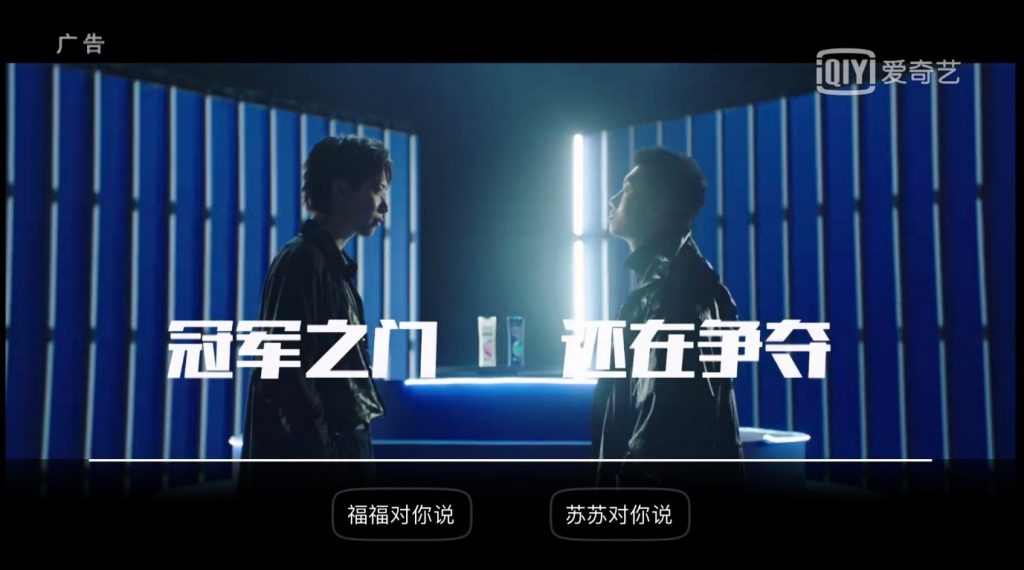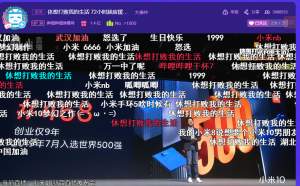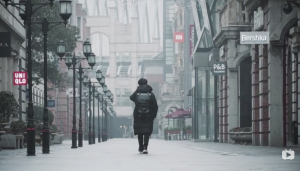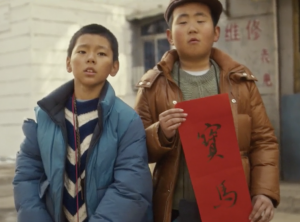
Rappers face off in an interactive native ad for Clear Shampoo on “Rap of China”
News From China
Coming just a few weeks after it released the first interactive native video ad, this week iQiyi published a white paper on the development of the format. According to iQiyi, interactive ads offer clear advantages for viewers as well as brands: they’re less disruptive and more empowering for audiences, offer greater exposure time for brands, and provide valuable feedback on consumer preferences. iQiyi’s interactive video platform lets advertisers develop features such as branching plots, the ability to switch perspectives, and screen exploration. The white paper also offers more info and advice on content design with examples.
Market uncertainty in 2019 has dampened the confidence of brand sponsors in China, but marketing budgets continue to rise. A few highlights from this Media 360 report:
- In order of preference, brands seek out 1) popular variety shows, 2) TV dramas, 3) less popular variety shows.
- 376 brands participated in Chinese variety shows in 2018, and the number is expected to be higher in 2019. Top brand categories for 2018 were internet companies (apps), cosmetics/bath products, and beverages.
- Costs for variety show sponsorship range from RMB 10 million to 1 billion (US$1.4 million to $140 million), while drama placements top out at around RMB 10 million.
- Successful TV series placements have shifted along with viewer preferences towards realistic urban dramas, with apartment rental and job search apps seen as the winners in this area.
- Social marketing budgets are increasing an average of 21 percent year-over-year, according to data from AdMaster, with an emphasis on user-generated content platforms and key opinion leaders (KOLs).
There has been a heavy emphasis on patriotic television programming in the run-up to the 70th anniversary of the founding of the People’s Republic of China. One brand that has found an opportunity in this space is Jing Liquor, the exclusive title sponsor of iQiyi’s “Me and My Motherland,” a documentary series focused on stories of China told by successful Chinese born after 1980.
More officially approved entertainment: China’s central bank partnered with Tencent to launch a financial education game on WeChat. Players answer personal finance questions to build their defenses in the game, which is called “Battle to Defend Wallets” in Chinese.
Video streaming site Youku announced a partnership with Sina Weibo to integrate Weibo’s “SuperTopic” fan community pages into Youku’s video platform and give Weibo users direct access to Youku’s content offerings. The partnership is also aimed at increasing cooperation in the hot area of short video.
News in English
- Pinduoduo just unseated Baidu to become China’s fifth-largest listed internet company by targeting underserved customers in lower-tier cities with its hybrid discount shopping and social media app, and it’s also one of the most active brands in Chinese entertainment. Here’s a guide to its business. China Skinny
- While the trade war may prompt more American companies to move production out of China, many brands — from Tiffany’s to Red Lobster — see their futures in the Chinese consumer. NPR, Bloomberg
- But there are still a number of big-picture issues that foreign brands have to be mindful of when marketing to Chinese consumers. China Business Review
- Hasbro’s recently announced deal to buy Entertainment One for $4 billion has a major China angle: EOne’s Peppa Pig is hugely popular in the country, and, along with PJ Masks, is expected to give the toymaker an “opportunity for a beachhead that can go in China for many years to come.” The Hollywood Reporter
- Can a Chinese pop star help Brand USA? Mandopop singer Jane Zhang has been tapped by America’s destination marketing group as the face (and voice) of a Weibo campaign called “Feel the USA.” SCMP
- Beijing’s recent order to keep mainland Chinese films, their creators and stars out of this year’s Golden Horse Awards in Taiwan has had an impact on the brand sponsors of the event, with Bulgari, Piaget, and Oppo reportedly pulling out. Malay Mail
Partner News
- Douyin’s Short Video Creators Get More Audience-Targeting Tools CFI
- How China’s Star Ship Troopers Are Redefining Modern Fandom CFI
- How to Earn Brand Loyalty From China’s Millennials Jing Daily
- Successful “Heritage” Marketing Resonates With Consumers in China Jing Daily
- UCCA Strikes Gold With Cai Xukun Vogue China Video Jing Travel






